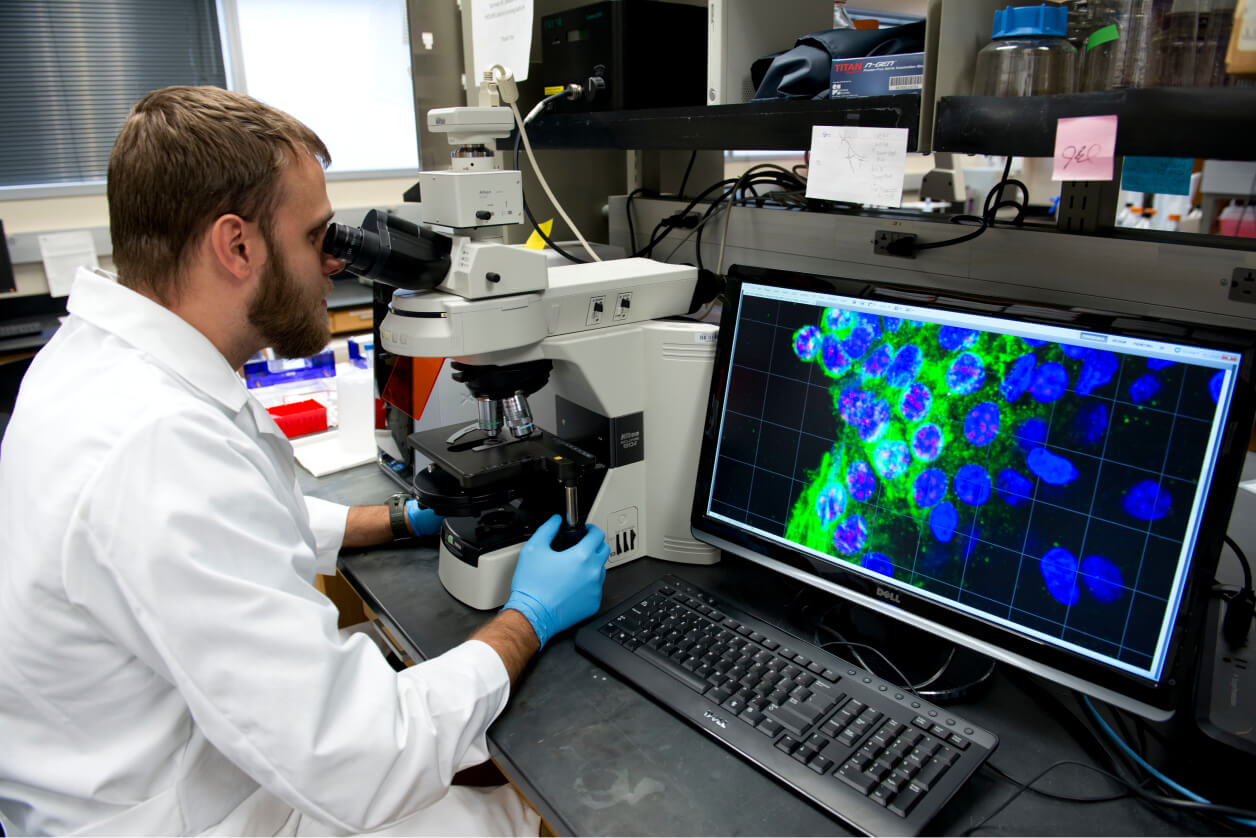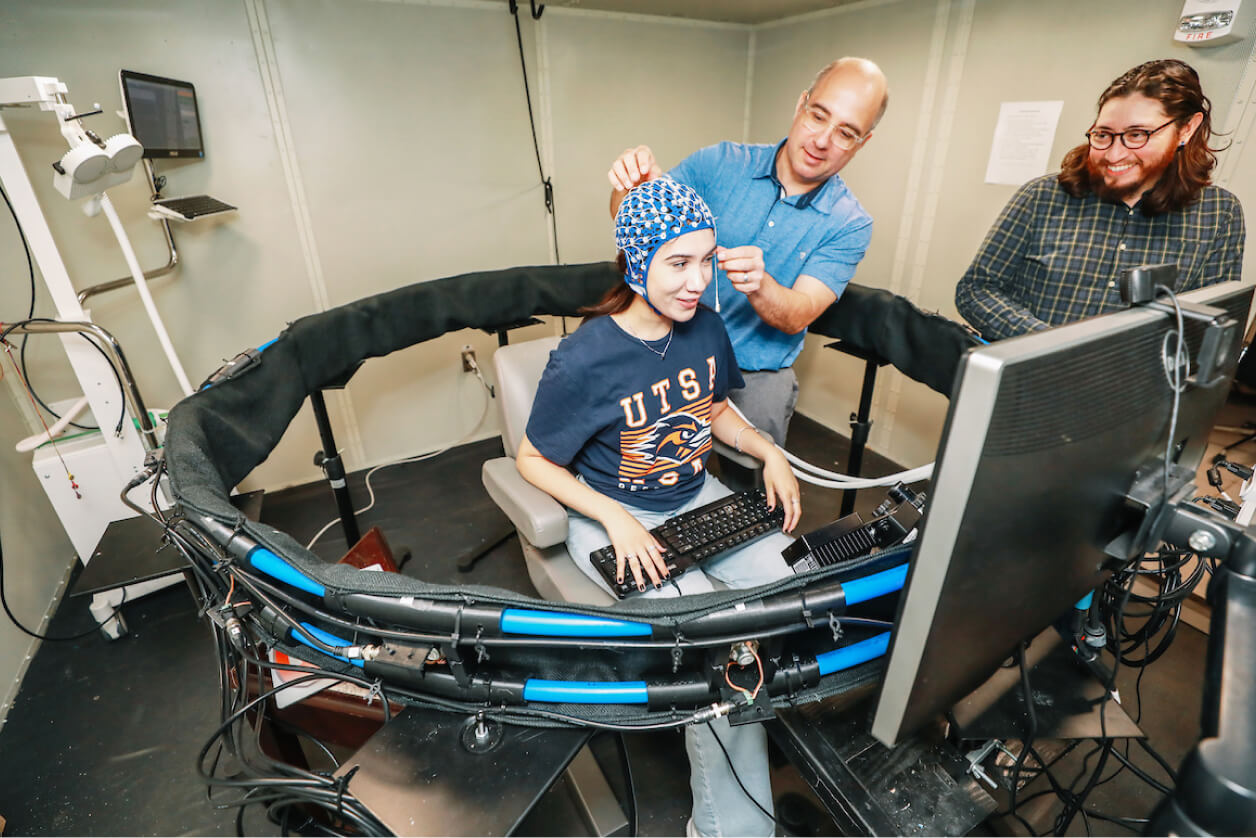
College of AI, Cyber and Computing
UTSA’s new college will serve as an innovation ecosystem for high-impact research and applied technology development to expand the university’s research reputation and further mature and expand public/private collaborations.

San Antonio Life Sciences Institute (SALSI)
Enables competitive grant proposals to the National Institutes of Health (NIH) and builds Texas’ health sciences workforce in neuroscience, cancer prevention, infection disease and regenerative medicine.

School of Public Health
UTSA and UT Health San Antonio have created a powerful new school to provide the skills and training to address the disparate healthcare landscape emerging across Texas. The State’s investment would match the combined $20 million investment from Bexar County and the City of San Antonio.

Restoration of Institutional Enhancement Funds
Institutional Enhancement funding permits UTSA to dynamically address university staffing needs and is part of the base operating budget support. UTSA has leveraged Institutional Enhancement funding to recruit, hire and retain world-class faculty scholars to align with strategic research goals and workforce needs.
San Antonio Life Sciences Institute (SALSI)
SALSI leverages the collective power of UTSA and UT Health San Antonio through formalized collaborations and curriculum alignments. Students in the life sciences have the unique opportunity to work with scholars across South Texas on groundbreaking research and innovations in patient care. SALSI facilitates joint doctoral degree programs that have led to many joint publications, patents and copyright filings.
Cybersecure Advanced Manufacturing for Texas
UTSA, via a partnership with the Department of Energy and industry experts, is leading the effort to secure our nation’s supply chains that face increasing challenges from pandemics, cyberattacks and foreign adversaries. State support is needed to augment federal resources, which are used to advance cybersecurity research and training that can help strengthen national security and increase competitiveness in global markets.
Bexar County Fostering Educational Success Project
For the first time, UTSA and partners across child welfare, the Children’s Court, and two- and four-year colleges in Bexar County are leading an effort to improve educational outcomes for foster youth and alumni. This project gives students with a history of foster care a better chance to reach their educational dreams through dedicated emotional, social, and professional network.
Prefreshman Engineering Program (PREP)
TexPREP is a program designed to motivate and prepare middle and high schoolers—many of whom are from underserved populations—for advanced studies and careers in science, technology, engineering, and mathematics (STEM). Each year this transformational program serves over 4,000 students from more than 125 school districts across the state. Over 80% of these participants are minorities and 53% are women.
Institute of Texan Cultures (ITC)
Located in Hemisfair Park in the heart of downtown San Antonio, the ITC is a Texas treasure. The ITC showcases the vibrant cultures that have contributed to the past, present, and future of our state’s social fabric. In order to meet the demands of tomorrow, state resources can support the ITC’s efforts to offer exhibits, programs and teacher training that benefit the state’s multicultural education and tourism.
Small Business Development Center Support
In cooperation with the U.S. Small Business Administration, UTSA’s SBDC promotes business and economic development across 79 counties along the southwest Texas border. Continued support is critical to the SBDC’s efforts to promote growth, innovation and sound management for nearly 30,000 small businesses. In addition, the Southwest SBDC helps promote small business economic activity and investment in areas of Texas where corporate expansions are uncommon, and state incentives—like the Enterprise Fund—are rarely accessible.
Texas Demographic Center (TDC)
Home to the Texas state demographer, the TDC provides access to reliable, impartial data used to inform policy decisions, strategies and solutions. Texas legislators, legislative committees, state agencies, counties, municipalities, and the private sector are beneficiaries of the TDC’s data and analyses. The TDC’s role is magnified during the 2020 Census and its effect on redistricting. Special item funding is vital to the Center’s ability to produce population estimates, biennial projections and trend analysis impacting the state of Texas.
Formula Funding
UTSA’s headcount increased significantly in the last decade, but its average per student appropriation decreased – and is well below the statewide average. An adjusted higher education funding formula that recognizes institutional growth and inflation rates is critical to UTSA’s trajectory as a nationally recognized research university and model for student success.
National Research Support Fund
In 2023, UTSA became the fifth Texas institution to qualify for the National Research University Fund (NRUF). When launched, NRUF funding provided institutions with nearly $10M annually. UTSA has also relied heavily on the Core Research program to fund research support and priority initiatives. With the combination of the Core Research program and NRUF into the new National Research Support Fund, UTSA requires a sustained source of similar funding.
Texas Research Incentive Program (TRIP)
TRIP makes available state matching funds for private gifts intended to enhance research productivity and faculty recruitment at Texas’ eight emerging research universities. TRIP funds have a direct impact on UTSA’s ability to recruit world-class faculty who elevate the student academic experience and the state’s reputation as a research powerhouse.
Toward Excellence, Access and Success (TEXAS) Grant Program
The TEXAS Grants are awarded to undergraduate Texas students who demonstrate financial need and meet academic eligibility requirements. Continued support of this program is especially important for UTSA’s first-generation, low-income students, a population that often has difficulties accessing and affording a college education.
Historically Underutilized Business (HUB) Program
The UTSA HUB program provides invaluable support to local small businesses, many of which are minority or women-owned. This innovative program helps local small businesses become part of the university’s procurement process, which aids Texas’ economic recovery.
Hazlewood Act Benefits
The Hazlewood Act provides qualified veterans, spouses, and dependent children with a generous tuition exemption at any public college or university in Texas. UTSA is committed to serving student veterans and their families and is consistently ranked among the top Military Friendly Schools in the nation. UTSA requests the Texas legislature to continue to provide funding relief to public universities for Hazlewood exemptions.
College of AI, Cyber and Computing
The new college will consolidate programs currently distributed across four colleges and solidify UTSA’s status as the largest information security hub outside of Washington, D.C. The new college will serve as an innovation ecosystem for high-impact research and applied technology development to expand the university's research reputation and further mature and expand public/private collaborations. To bring this college to fruition—and transform the Texas economy by training talent for in-demand careers of the future—UTSA requires additional investments in research expertise, advanced technology and research infrastructure expansion.
San Antonio Life Sciences Institute (SALSI)
SALSI leverages the collective power of UTSA and UT Health San Antonio through formalized collaborations and curriculum alignments. Students in the life sciences have the unique opportunity to work with scholars across South Texas on groundbreaking research and innovations in patient care. SALSI facilitates joint doctoral degree programs that have led to many joint publications, patents and copyright filings.
CCAP/PUF Capital Project: Interdisciplinary Research Complex
UTSA's first capital project focuses on a new research facility, or a building complex, designed to house a comprehensive suite of research capabilities. A new 131,500 gsf complex will provide an additional 85,475 assignable square feet to house a comprehensive suite of specialized research facilities. The new Interdisciplinary Research Complex is a critical element in the university’s strategic plan and is needed to compete with aspirant peers in the prestigious Association of American Universities.
CCAP/PUF Project: Building Revitalization
UTSA requests funding for building revitalization projects, resulting in significant improvements to infrastructure, improved health and safety and an enhanced campus experience.
University of Texas School of Public Health San Antonio
As our state and nation emerge from the pandemic, the need to fortify Texas’s public health infrastructure has only become more critical. With their combined talent and research prowess, UTSA and UT Health San Antonio have created a powerful new school for the benefit of all Texans. Launched in 2022, the new school is located in an existing building on the campus of UT Health San Antonio and serves as one of three schools of public health in The University of Texas System.
Additional Resources
- UTSA and UT Health San Antonio 89th Legislative Session Joint Strategy
- Creating Career-Ready Graduates
- The Quantifiable Value of a UTSA Degree
- Advancing Texas' Professional Workforce
- Powering Texas' Economic Engine
- From Neurons to Policy: Investing in Brain Health Research for Texas
- Texas Senate Districts: UTSA Demographics
- Texas House Districts: UTSA Demographics
- Quantum Institute for Cyber Resilience (QulCR)
For More Information
Jason Hassay
Government Relations
The University of Texas at San Antonio
o: 210.458.5102 | m: 512.413.9598
jason.hassay@utsa.edu
Albert Carrisalez
Government Relations
The University of Texas at San Antonio
o: 210.458.5138 | m: 210.452.7557
albert.carrisalez@utsa.edu
